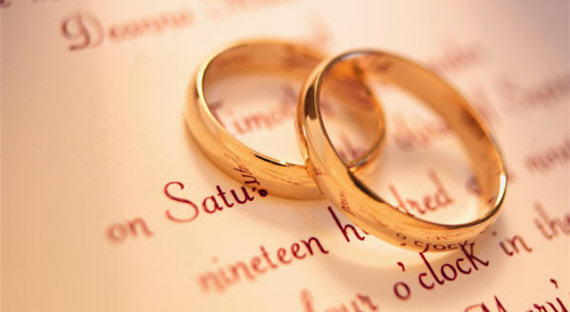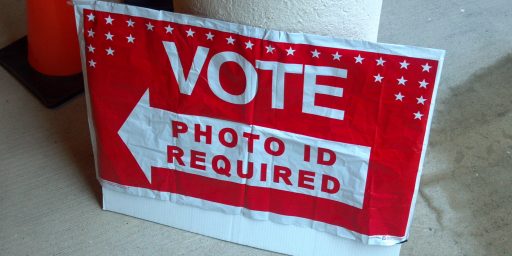Getting The State Out of the Wedding Business
Why is the marriage ceremony the government's concern?
When I saw the headline “Getting the Government Out of Your Wedding” via memeorandum, I naturally presumed it was about same-sex marriage. But Paul Waldman isn’t arguing that the government should get out of the marriage business; rather, it’s weddings that shouldn’t be the business of state.
Monday, a federal appeals court struck down an Indiana law restricting who may officiate at weddings.
The three-judge panel ruled that Indiana’s marriage statute discriminated arbitrarily among religious and ethical beliefs, favoring certain religions over others and disfavoring members of humanist societies who wanted their marriages sanctified by someone holding the same beliefs.
The decision marks a significant victory for nonreligious Americans. The appeals court declared that the First Amendment mandates a neutrality principle under which states may not favor or disfavor religion when compared with similar secular belief systems.
During argument before the court, Indiana officials said humanists could circumvent the state’s marriage restrictions by simply calling itself a religion and having a member apply to the Universal Life Church or similar organization to obtain “clergy” credentials.
Judge Frank Easterbrook of the Chicago-based Seventh US Circuit Court of Appeals said that the humanists rejected such proposals.
“They are unwilling to pretend to be something they are not, or pretend to believe in something they do not,” he wrote. “They are shut out as long as they are sincere in following an ethical system that does not worship any god, adopt any theology, or accept a religious label.”
Indiana officials had also suggested the humanists could conduct a public wedding ceremony officiated by a humanist celebrant and later have a court clerk solemnize the marriage in accord with state law.
“That’s true enough – but it just restates the discrimination,” Judge Easterbrook said. “Lutherans can solemnize their marriage in public ceremonies conducted by people who share their fundamental beliefs; humanists can’t.”
The plaintiffs sought to have the state recognize any ceremony performed by a notary public. While the court did not mandate that outcome, Easterbrook pronounced it ”hardly seems an excessive request.” Waldman would go further:
What we really ought to do is eliminate the regulation of weddings entirely. Since marriage is a legal status that changes your relationship to the state, there is and ought to be certain things you have to do to make that change happen. If the state wants to make it more than just the filling out of a form—perhaps with a brief civil ceremony the couple has to perform—that’s fine. And then once they’ve done that, people should be able to have any kind of wedding they want. The wedding, in other words, should be a ritual with no content prescribed by the state, no “By the power vested in me by the state of Indiana” at all. If Baptists decide that henceforth all their weddings must feature the couple singing a duet of “You Don’t Bring Me Flowers” as a sobering reminder of the dangers of growing apart in order to be considered a true marriage in the eyes of the church, then that’s up to them. If a group of people decides that they’ll only be married by trained Dungeon Masters, then they should have at it. If you want to have your dog officiate at your wedding, that ought to be your choice. The state doesn’t tell you how to celebrate Christmas or Ramadan, and it shouldn’t tell you how to get married.
In other words, religions should determine what they consider sacred, and the state should determine what it considers legal, and the two need not have anything to do with each other.
That seems right to me. Coincidentally, it happens to be precisely the opposite of what some opponents of same-sex marriage propose when they say they want to “get the government out of the marriage business.” Because marriage is a sacrament to many Americans, they argue, it’s wrong for the state to confer that title to unions that those people consider abhorrent. So, they want to put churches in the business of deciding who may be married and the state in the business of deciding who gets the legal rights that currently come with marriage but under a different name, such as civil union.
While that solution struck me as a reasonable compromise a decade ago, it’s clearly wrong. It’s of a piece with municipalities closing their public pools—and in some cases, even their public schools—in the wake of court-ordered racial desegregation. Twenty years ago, the notion that the government shouldn’t recognize marriages would have been a fringe notion; the only reason it’s an issue now is because the courts—and in some cases, the people themselves—have decided that gays should be allowed to marry, too.
No, Waldman is right here. Marriage is a legal status conferred by the state. Weddings are, depending on the couple, a sacred religious experience or a really expensive party celebrating their marriage with friends and family. The couple should be free to have anyone they choose—or no one at all—preside over it.






On some level, I’ve never understood why the state should care whether someone’s wedding ceremony is performed by an ordained minister or their Uncle Steve. So, this seems like a fairly correct decision to me. Indiana’s law in particular seemed to go over the top in its regulations on who could and could not perform ceremonies. In some states, such as I believe New York but someone can correct my on that, wedding ceremonies can indeed by performed by a Notary Public.
As for the whole “getting the government out of marriage” argument, as I’ve noted before, there are a whole host of issues related to “marriage” that require government involvement of some kind — ranging from the question of who is legally able to get married to what happens to marital property and children on the dissolution of the marriage or death of one of the parties — that it strikes me as darn near impossible for the law (i.e., the government) to not be involved.
You are probably correct that it is too late to go the civil union route, which is what i preferred, still do, all along. However, churches can still refuse to recognize or bless the marriages as a matter of religious practice. By an large I think they are avoiding this as they don’t want to offend too many people, which is why they have tried to keep it illegal.
Steve
This is exactly right. As @Doug Mataconis said, the government has all sorts of legal interests in marriages. Religious organizations have their own interests, but those interests don’t intersect with those of the government.
IMHO a religious figure shouldn’t be able to perform a state-recognized wedding anyway, but if we’re going to authorize them to do so, we shouldn’t limit the authorization to them.
@Mikey:
Don’t anyone tell the religious right*** that.
*** this includes all religions all over the globe. If there is one thing extremists of every religion known to mankind share in common, it is the desire, nay… The Duty, to force their religion on others.
I have often wondered that if the the definition of marriage as one man and one woman was ever enshrined in our constitution, as some on the right would like, would that mean that Catholic priests would then be required to solemnize non-Catholic couples?
@Doug Mataconis:
I was both married and officiated the marriage of a friend in California. We paid $50 to the county clerk to deputize a friend for a day to perform our marriage. I paid $15 to be ordained online to perform the ceremony for my friends. If anyone needs to get hitched, I perform weddings for beer and dinner.
@Grewgills:
Yea, it’s easier in some states than others. I recall reading about the Indiana statute when the lawsuit was filed there; the statute there was particularly egregious in how it limited who could perform civil marriage ceremonies.
My wife and I never had any interest in seeking legal validation from the state. We were together for 10 years before she decided to quit her job and try to start a business. My employer would not let me add her to my insurance as a domestic partner, as that designation was reserved for same-sex couples, despite the fact that Illinois civil unions were also available to same sex couples.
So we got married, which also had some minor tax advantages. My brother in law paid $15 for a nonsense minister certificate on the web and signed our marriage certificate. It was a sham, just some other bullshit we had to do like buy a permit to park on the street where we own our house. In the eyes of religious marriage purists, ours was a perfectly acceptable marriage, but to us it was just a bureaucratic chore.
Now that we’ve got Obamacare, which makes it affordable for entrepreneurs to pursue their ventures without employer-sponsored coverage, and our tax situation has changed, we’ll be filing our divorce papers this year. Another nonsense chore, but it will get the state out of our relationship, where they should have no place anyway, for good.
@mantis: Fox News headline: “ANOTHER COUPLE DIVORCES DUE TO OBAMACARE”
@Mikey: Good catch!
@Mikey:
Heh, indeed.
@Doug Mataconis: I think what James is saying “let’s split this in two. You get a marriage license and sign it in front of a notary, you’re married in the eyes of the law. Whatever you do in your religion and in your own sweet time is up to you, but it has no legal effect.”
The French system, in other words.
@mantis:
Why give up the tax and other benefits? Personal question I know, but I’m curious.
@grumpy realist:
And that’s essentially what I’m in favor of, although on some level I don’t really see the problem with allowing ministers who perform the religious marriage ceremony to also have the ability to sign off on the form for the civil license. What’s the need to basically have two different ceremonies?
Marriage was a civil/state matter for centuries longer than it was a religious sacrament. The earliest references to it in Catholicism are from the 12th century, and it wasn’t until the 1500’s that it was officially recognized as a sacrament. For most of human history marriage was about tying families together, generally for economic reasons (even consent was optional, especially if you were female, but the groom didn’t necessarily have much say in arranged marriages either).
@Doug Mataconis: that’s what we have now, but that requires some sort of recognized official signing that he’s officiated at the marriage ceremony. So either you go in front of a notary public/judge/state official and get the paperwork signed (in which case the state doesn’t care bupkis if you follow it up with some sort of ceremony), or you go and have a “wedding ceremony” at which someone temporarily or permanently licensed/recognized by the state says “bless you my children” and signs off on the paperwork.
If you want to go ahead and get married by your Uncle Steve, then fine. It’s just that the state seems to want Steve to have thought enough about this to actually jump through the hoop of getting licensed, rather than just carrying this out in a drunken stupor.
@Doug Mataconis:
In general, it’s the fact that you are doing two completely unrelated things:
1. Establishing a legal contract that conveys certain rights and responsibilities under the law to the parties involved.
2. (Optional) Performing a rite that establishes a relationship recognized as significant by adherents of a particular faith or philosophy.
What Catholics and lawyers agree on is that the marriage creates a new entity that is not identical to (nor merely the sum of) the entities that existed prior to the marriage. It’s much like an incorporation to the lawyers, and much like a birth to the Church.
It makes perfect sense to not have Reverend Spike or Ayatollah Butch or Baghwan Sri Jeff do the legal contract; it’s not their field of expertise. Similarly, the local JP or Notary Public probably isn’t the right choice to solemnize your new Oneness Before Jo-Bu.
@Grewgills:
Why give up the tax and other benefits?
Tax benefits no longer really apply due to our income situation. No other benefits existed that we could not achieve otherwise apart from social security, which isn’t really a factor for us. The primary motivation is personal opposition to the institution generally and the state’s involvement.
The cleric with a notary commission in many other states can do the two fer one ceremony.* Indiana fails democracy lab.
* Magic users, fighters, thieves are also welcome to officiate as notaries.
Trained Dungeon Masters?
Does that mean I’d have to make a successful Charisma Saving Throw to get married? Would the bonus on my belt of Dwarvenkind add to the role?
Would the Dungeon Masters have to be DCI sanctioned by Wizard’s of the Coast or would membership in the RPGA be sufficient?
@mantis:
The ones that come up a lot in SSM discussions are visitation rights in hospitals, end-of-life decisions, and medical decisions in the event of incapacitation of one of the parties. I had thought that those were areas where it was not possible to write a non-marriage contract with an arbitrary other that would cover all the bases. I suppose it might vary from state to state (since most things do, legally speaking).
Not trying to pry or advise; just musing aloud and wondering if I’ve misunderstood something.
One a more serious note, when I lived in Alaska for an extra $15.00 you could get a temporary permit in order to perform a wedding. When my ex-wife and I got married, my roommate at the time performed the ceremony….
I’ll just stop that comment right there.
@DrDaveT:
The ones that come up a lot in SSM discussions are visitation rights in hospitals, end-of-life decisions, and medical decisions in the event of incapacitation of one of the parties. I had thought that those were areas where it was not possible to write a non-marriage contract with an arbitrary other that would cover all the bases.
Not an arbitrary other. You have to be specific. Power of attorney and a living will can cover everything except maybe hospital visitation, but that is usually only a real issue if the partner and the patient’s parents (or other kin) don’t get along. Not an issue for us.
Our solutions are certainly not for everyone, and may be more trouble than they are worth, I am aware. We’re kind of strange that way.
@mantis:
That’s what I meant. Arbitrary in the sense of whoever you decide to specify, not in the sense of randomly chosen or unspecified. As in, my choice of heir is arbitrary, as far as the law is concerned, but very specific, given what my will says.
I think I just found my post-civil service/military profession.
Seriously though, it’s been obvious to me for a long time that separating the legal and religious aspects of marraige is prudent and might even calm down part of the culture wars.